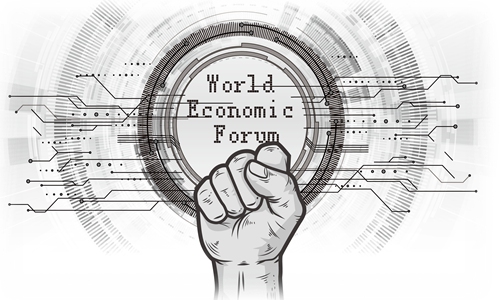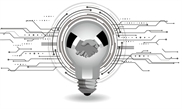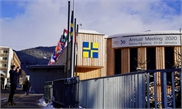
Illustration: Luo Xuan/GT
The easing of the trade war does not offer sufficient relief to concerns over a potential China-US technology war. On Tuesday, about 3,000 participants from 117 countries and regions including US President Donald Trump and German Chancellor Angela Merkel are set to kick off the 50th World Economic Forum (WEF) annual meeting in Davos, Switzerland. Hopes are high that the meeting will keep a world technology war from breaking out.Despite the phase one trade deal signed by China and the US last week, the fate of Chinese technology companies is still unclear. The US has been escalating tension in the area of technology competition. The US Commerce Department sent regulations to the Office of Management and Budget that would restrict US companies' sales to Huawei from their overseas facilities, according to a Wall Street Journal report citing people familiar with the matter.
The US has also stepped up pressure and sent a delegation to the UK to push a Huawei ban ahead of the UK deciding on whether to upgrade its telecom network with Huawei devices, which is due later this month.
Germany is also divided on using Huawei, though politicians including Interior Minister Horst Seehofer have warned of 5G delays if Huawei is excluded.
Aside from Huawei, other Chinese technology companies such as dronemaker DJI, short video platform TikTok and artificial technology company Hikvision were also targeted by the US for various groundless reasons. Behind the accusations, the US' attempt to squeeze Chinese technology companies out of the global market has only one possible goal: to keep the US advantage in the technology field from being caught up with by China.
Against the background of a technology arms race initiated by the US, which has adopted an increasingly tough stance, the WEF can surely play a role and provide a communication platform for countries to redefine global technology competition.
Technology will be one of the key themes of the 2020 WEF. A thorough discussion among the world elites on how to ensure economies and societies truly benefit from new technologies is worthwhile.
Media reports said that more than 100 Chinese representatives, many of whom are business leaders, are going to Davos. The 75-year-old Huawei CEO Ren Zhengfei is set to be a panel speaker at the WEF while his daughter, Huawei's chief financial officer Meng Wanzhou, shows up in a Canadian court for an extradition hearing. There are anticipations that benign interactions will happen at the forum between Chinese business leaders and Western politicians to improve mutual trust.
Tough restrictions from the US and heated debate on Huawei in Europe have been intimidating for Chinese companies that are preparing to set sail overseas. Right by the Alps, business leaders from China and the rest of world will seek hope amid the chilly winds of global technology confrontation.
The author is a reporter with the Global Times. bizopinion@globaltimes.com.cn



